The 2024 elections represent a turning point in the process of building a “Strong Parliament,” which I had the privilege of observing as an “International Observer”. It should be noted that this observation was not a purely individual endeavor. In total, 851 individuals, comprising numerous esteemed regional and international institutions and organizations from across the globe, in addition to non-governmental organizations (NGOs) and members of the media, travelled to the most remote regions of the country as international observers, closely monitoring the electoral process.
The mature and intense struggle of the Uzbek people and political parties in the elections, held in a transparent, free, and fair environment, alongside the mutual respect and political ethics displayed by the participating parties despite the challenges, did not escape the attention of international observers. Observations demonstrated the progress made by the culture of democracy in Uzbekistan. As someone who has closely monitored the developments in Uzbekistan’s political landscape over the past two decades, including the referendum, parliamentary, and presidential elections, and shared insights on these events with readers on numerous occasions, the shift in Uzbekistan’s political orientation towards a more nationalistic and people-centered approach, with a focus on strengthening the country’s internal stability and democratic institutions through comprehensive reforms, has been a noteworthy and encouraging development.
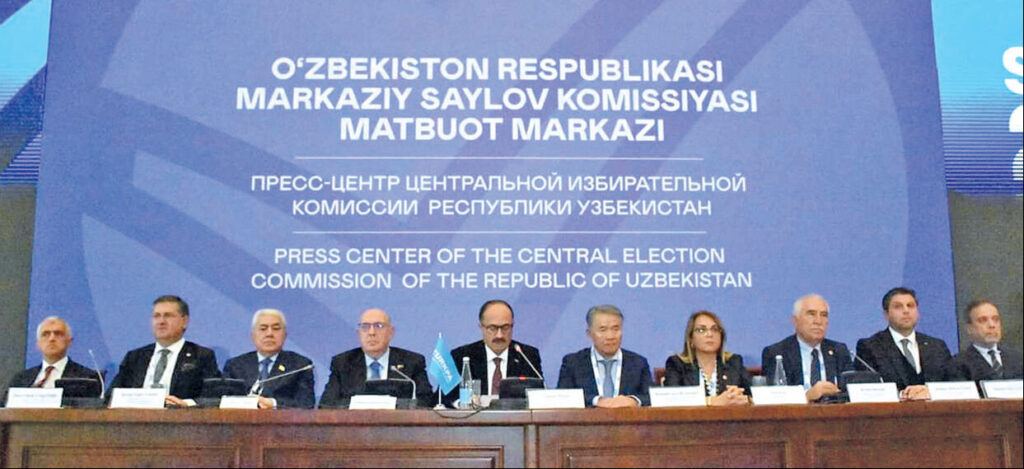
“My Choice, My Prosperous Country”
In the first elections held following the adoption of the new constitution, five political parties took part in the voting process for the Legislative Assembly, the lower house of the country’s Parliament, as well as for the Provincial and District Councils. In total, 875 candidates (500 for proportional representation and 375 for the majoritarian system) competed for 150 seats.
Despite the differences in the areas of focus and priorities reflected in the programs of the five parties, a complementary and supportive relationship was evident. Each party sought to contribute to the development of a stronger Uzbekistan and a national, prosperous society.
For instance, while the Liberal Democratic Party has committed to construct a sustainable economy and increase GDP to $160 billion by 2030, the Democratic Party of National Rise has declared its primary objectives the creation of a society based on national values and development. The Social Democratic Party for “Justice,” with the slogan “Towards Equal Opportunities and a Just Society,” has stated its intention to establish a legal system based on the principles of social justice and the rule of law, with a view to safeguarding human rights and freedoms. The Ecology Party, which prioritizes environmental protection issues, also distinguished itself in the elections with the slogan “Let’s Unite for Nature”. The People’s Democratic Party, for example, pledged to enhance the social security and pension system, ensuring active state participation in the economy with the slogan “Strong Social Policy”.
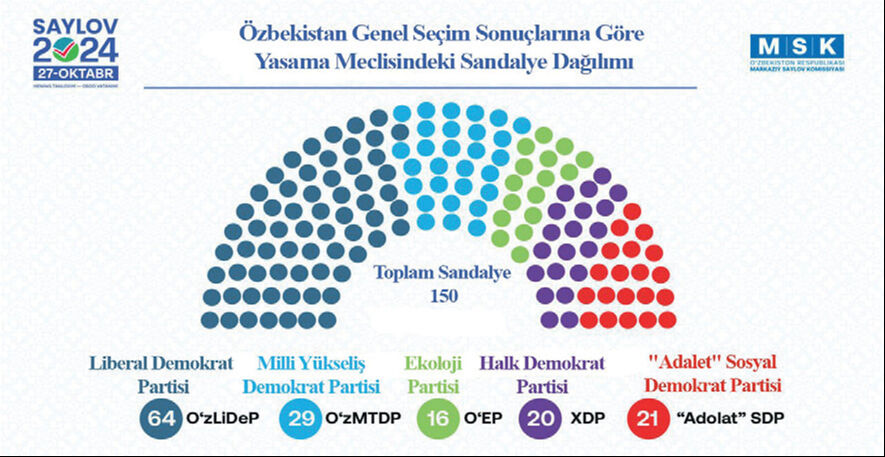
How to evaluate the chair distribution?
The provisional ballot counting results released by the Central Election Commission of Uzbekistan reveal that, of the five parties participating in the elections, the Liberal Democratic Party received 42.7% of the votes, while the National Rise Democratic Party received 19.3%, the Social Democratic Party “Justice” received 14%, the People’s Democratic Party received 13.3%, and the Ecology Party received 10.7%. In accordance with these results, it is expected that the Liberal Democratic Party should win 64 seats, the National Rise Democratic Party 29, the Social Democratic Party “Justice” 21, the People’s Democratic Party 20, and the Ecology Party of Uzbekistan 16.
As it will be remembered, as a result of the December 2019 parliamentary elections, the Liberal Democratic Party won 53 seats in the 150-seat Legislative Assembly, the Democratic Party of National Ascension 36, the Social Democratic Party “Justice” 24, the People’s Democratic Party 22 and the Ecology Party of Uzbekistan 15. When we look at today’s picture, it is apparent that the ruling Liberal Democratic Party has further consolidated its position. This change and the rate of participation in the elections (74.7%) was undoubtedly due not only to the discourses and commitments of the parties in line with the goals and policies prioritized in their election programs, but also to the successful work of the ruling party in recent years.
What were these changes? What did the voters vote for?
The Uzbek people voted for numerous innovations that distinguish this parliamentary election from previous ones. According to the election law that came into force for the first time in these elections:
- The elections to the Legislative Assembly were held according to the majoritarian and proportional representation system (until now, Uzbekistan had a majoritarian electoral system in which candidates who received a majority of votes in their constituency were considered elected, and all candidates had to represent political parties in the country),
- In the election, 75 deputies were elected from 75 regions according to the majority electoral system and 75 deputies according to the proportional representation electoral system,
- Non-party members were also included in the list of parliamentary candidates,
- At least 40 percent of the list of parliamentary candidates of political parties consisted of women,
- The party that wins the most votes in the elections will get the right to nominate a prime ministerial candidate and present it to the head of state for approval.
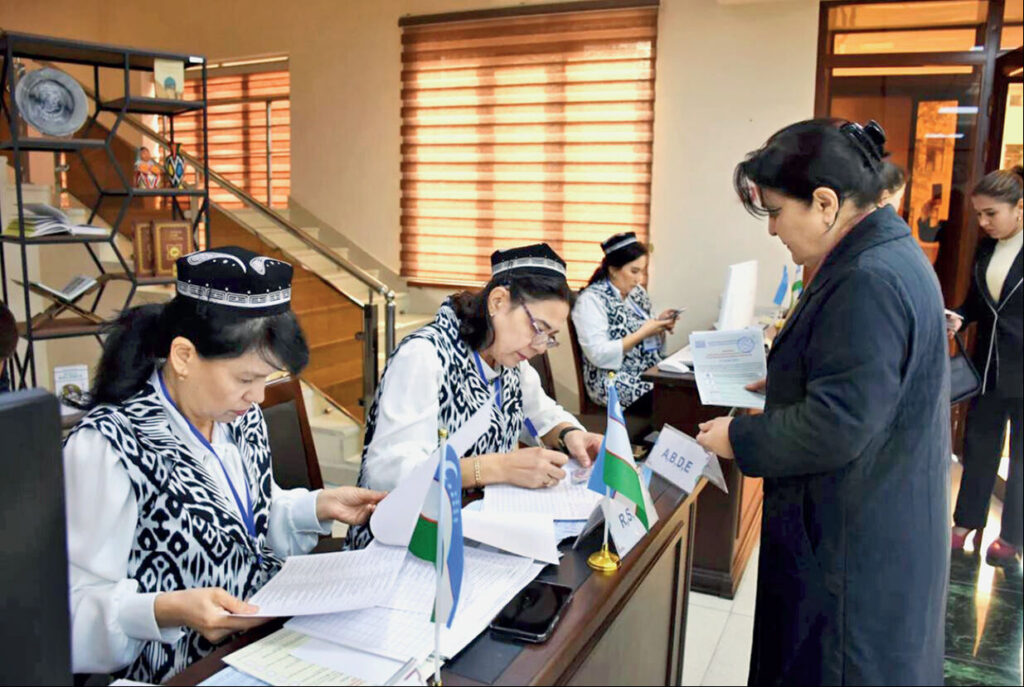
A Parliament with Robust Female Representation
According to the election results, the number of female deputies in Uzbekistan’s new parliament is expected to increase. This is undoubtedly due to the fact that at least 40 percent of political parties’ lists of parliamentary candidates are women. This change is intended to make the country’s political representation more inclusive. This alone is significant in terms of the Uzbek understanding of the state and society, which has always valued women and considered them to have an exceptional and indispensable place in the construction of a strong civilization, culture and art (e.g. Zebunisa, Uvaysiy, Nadire, Anbar Otin, Zulfiya), society and the state.
“History-Values-Civilization-Geography-Human Oriented Uzbek Model”
Undoubtedly, this picture is also very important in terms of showing the strong response of the democratic culture to the reforms implemented by Uzbekistan in the process of nation-state building, which has a strong civilizational background and state tradition. At this stage, “New Uzbekistan” seems to have strongly blended its own identity, history, values, knowledge and experience with a modern democracy and governance approach, taking into account successful examples from around the world.
As a concrete example, the “Neighborhood System” (Mahalle Sistemi), which is a legacy of centuries from tradition to modernity and reflects the spirit of solidarity and social responsibility in Uzbek society, is the most organic organization that implements social projects with its own resources and will, which many NGOs in the world cannot do today.
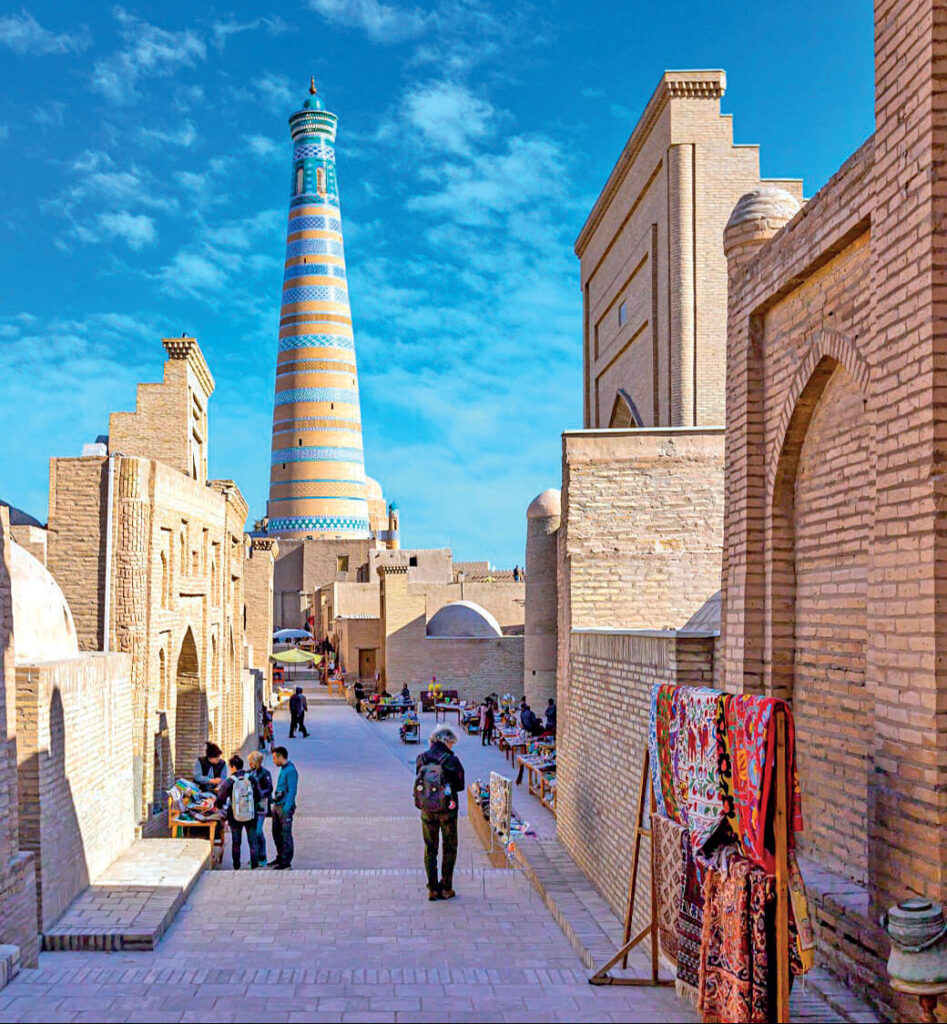
“The Model of Root and Body Incarnated”
The “Uzbekistan Model” is built upon a deep accumulation of knowledge, historical memory transfer, experience, civilization and cultural understanding, blended with today’s realities, systems, practices and disciplines. More concretely, the descendants of ‘Farabi’ and ‘Biruni’, who are known as the founders of political philosophy, seem to have successfully adapted their ancestors’ views on political philosophy and state governance, that are relevant to today, to today’s politics, democracy and state governance models, and built their own unique models. In this context, it can be said that the unity of root and body has been successfully achieved. Uzbekistan has clearly demonstrated that it is only possible to successfully implement democracy based on roots. This is what lies at the heart of the success of the current Uzbek model.
Therefore, against top-down models and impositions, Uzbekistan appears to have preferred a model that reflects its own history, people, and values. This model takes into account the demands and expectations of the grassroots at every stage, ensuring that the will of the people is included in the system from the bottom to the top and implemented with their approval without delay. This model is a great success in terms of shifting from rhetoric to practice an understanding that truly puts human beings at the center and respects the national will with the theme For the Dignity of Man (İnsan Kadri İçin).
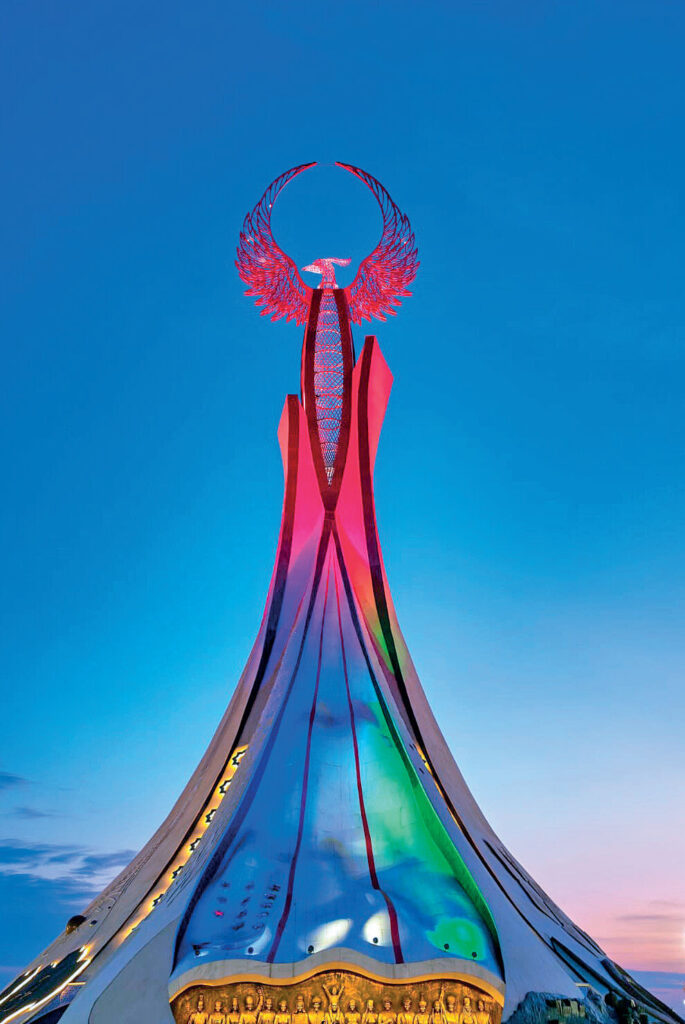
Key Factor in Building Authentic Democracy and a Strong Parliament: Aiming for a Third Renaissance
Especially the reforms realized in the last eight years and a decisive will and leadership backed by popular support have played an important role in the formation of this situation. More concretely, the democratic personality of Uzbek President Shavkat Mirziyoyev, the architect of the Third Renaissance, who focuses on people and respects them, has enabled these reforms to be implemented much stronger and faster.
The parliamentary elections demonstrated the country’s progress in adapting to multi-party political life and building a genuine democracy by internalizing national values and liberal understanding. The vote share of the parties and the voter turnout are of great importance in terms of confirming the success of these reforms as well as the interest and trust in the democratic process in the country. Therefore, these election results can be interpreted as a success of the Third Renaissance Movement under the leadership of Mr. Mirziyoyev.
“Model Country”
In conclusion, the “New Uzbekistan”, which emerged from the election results with great success, has sent a clear message that it will continue its strong march as a “Model Country”, guided by the model it has developed and the groundbreaking steps it has taken, all in line with the spirit of the “Third Renaissance”. Having completed its electoral process, Uzbekistan will now focus entirely on the goals ahead, channeling all its energy toward this direction. In this context, the “New Uzbekistan” movement, which has had a profound impact on the region, and the “New Central Asia” process, gradually evolving with its sharing spirit, will be instrumental in strengthening regional organizations, especially the Organization of Turkic States, with greater momentum.
